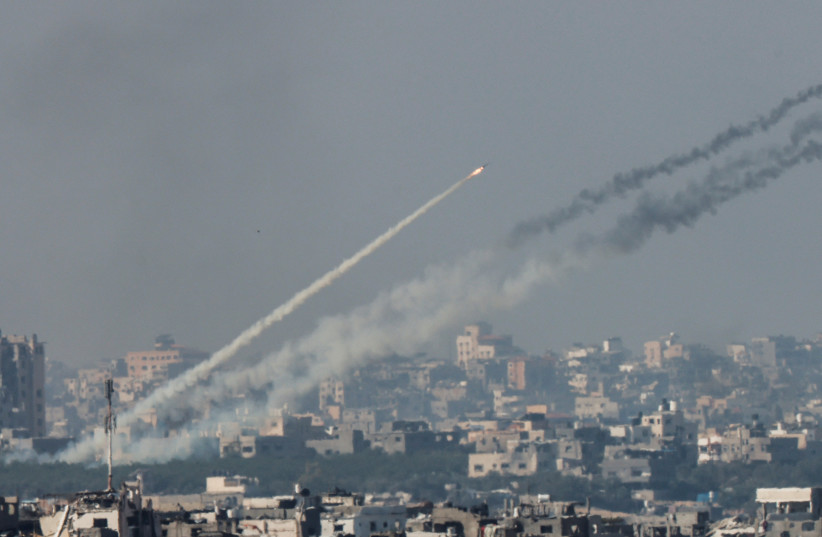The IDF spokesperson in Arabic exposed close cooperation between terror groups in concealing information and choosing launch areas far from houses of Hamas leadership, not Gazan citizens.
Avichai Adraee, the IDF spokesperson in Arabic, revealed on Saturday an official Hamas document recovered by Israeli soldiers in Gaza, which openly refers to Gazan casualties as a result of failed rocket launches, hiding this information from their constituency and blaming the deaths on Israel instead.
The revealed documents date back to 2020 and Operation Breaking Dawn (2022), and they were issued by Hamas’s al-Qassam Brigades and signed by high-ranking members of the militia. The findings showcase Hamas attempting to persuade members of other militias in the Gaza Strip, namely the al-Quds Brigades belonging to the Palestinian Islamic Jihad (PIJ), to take responsibility for the disastrous outcomes of failed rocket launches (referred to euphemistically as ‘local rockets’). The PIJ responded by requesting to conceal these failed launches and their repercussions to “support the image of the resistance.”
Another document showed a recommendation by Hamas to deny PIJ launching rockets specifically in the vicinity of houses belonging to the Hamas leadership fearing repetition of such events, yet no mention of preventing firing rockets near other Gazan residents’ houses was mentioned.
Lastly, Hamas reports were exposed featuring names of Gazan casualties as a result of failed launches, which were then recycled by Hamas in their outward reports of casualties, alleging they stemmed from Israeli airstrikes. In other words, Hamas counted casualties from PIJ failed rockets as casualties from Israeli attacks, proving yet again the lack of accuracy of their propaganda reporting.

These documents attest to the extent of Hamas’s control over and coordination with other militias in the Gaza Strip, dismissing the perception of some thought to be “unruly factions” acting from Gaza against Israel “on their own will,” and proving yet again that Hamas was, in fact, in control of these factions.
‘11% of launches towards Israel since October 7 fell inside Gaza’
“These documents clearly show that terrorist organizations in Gaza are cooperating to hide the extent of the destruction and killing caused by failed launches that fall on the residents, while making an effort to protect Hamas terrorists, overlooking the danger to civilians,” said Adraee in his statement.
“These documents prove that the terrorist organizations in Gaza are lying and concealing failed missile launches that resulted in the deaths of civilians in the Gaza Strip. Hamas was aware of the high rate of failed launches carried out by the Islamic Jihad and the danger it poses to the homes in the vicinity of which the launches took place, and even directed it to them, demanding that they not set up launch pads in the vicinity to their members to avoid putting them in risk,” Adraee continued.
“Among other things, the names of the seven casualties appear as a result of a local rocket shell hitting near the Imad ‘Aql Mosque in Jabalia. Although Hamas reports indicated that they were killed as a result of failed launches, the report issued by the [Hamas] Ministry of Health in the Gaza Strip claimed that they were killed as a result of an Israeli raid.
“The IDF seized many other documents indicating that terrorist organizations knew about the tragic consequences of the failed launches, but the method of action is clear: to hide the information and accuse Israel,” continued Adraee.
Adraee added that during the current war, high rates of failed launches carried out by Hamas and Palestinian Islamic Jihad were recorded – with 11% of launches towards Israel since October 7 falling in the territory of the Gaza Strip.
Earlier this month, Adraee revealed a document showing Hamas was worried about PIJ’s propaganda plans on their media outlets, also fearing that the organization would steal credit for Hamas’s “resistance” efforts.
Both Hamas and Palestinian Islamic Jihad are designated as terror organizations by many countries in the West, both operating mainly in the Gaza Strip with a certain presence in the West Bank as well. Both groups garner support from Iran and its proxies; however, while Hamas is deeply rooted in political Islam and the Muslim Brotherhood’s ideology, the PIJ aligns more closely with Iran’s revolutionary ideology and the “Axis of Resistance.”
Additionally, Hamas is intricately woven into Palestinian society, functioning akin to a semi-state entity, whereas PIJ operates with greater independence. Recent efforts to project solidarity between the two factions obscure underlying tensions, exemplified by Hamas’s hesitance to engage with Israel during Operation Breaking Dawn, causing discontent among PIJ members.
